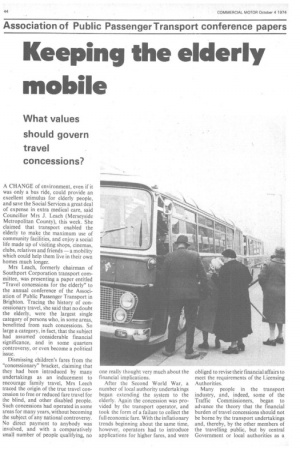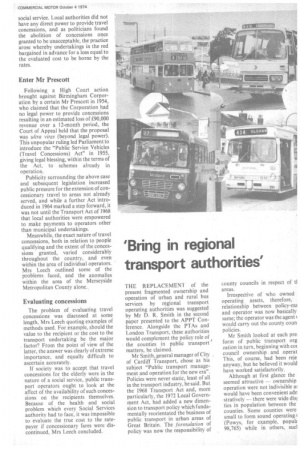Keeping the elderly mobile
Page 46

Page 47

If you've noticed an error in this article please click here to report it so we can fix it.
What values should govern travel concessions?
A CHANGE of environment, even if it was only a bus ride, could provide an excellent stimulus for elderly people, and save the Social Services a great deal of expense in extra medical care, said Councillor Mrs J. Leach (Merseyside Metropolitan County), this week. She claimed that transport enabled the elderly to make the maximum use of community facilities, and enjoy a social life made up of visiting shops, cinemas, clubs, relatives and friends — a mobility which could help them live in their own homes much longer.
Mrs Leach, formerly chairman of Southport Corporation transport committee, was presenting a paper entitled "Travel concessions for the elderly" to the annual conference of the Association of Public Passenger Transport in Brighton. Tracing the history of concessionary travel, she said that no doubt the elderly, were the largest single category of persons who, in some areas, benefitted from such concessions. So large a category, in fact, that the subject had assumed considerable financial significance, and in some quarters controversy, or even become a political issue.
Dismissing children's fares from the "concessionary" bracket, claiming that they had been introduced by many undertakings as an inducement to encourage family travel, Mrs Leech traced the origin of the true travel concession to free or reduced fare travel for the blind, and other disabled people. Such concessions had operated in some areas for many years, without becoming the subject of any national controversy. No direct payment to anybody was involved, and with a comparatively mall number of people qualifying, no one really thought very much about the financial implications.
After the Second World War, a number of local authority undertakings began extending the system to the elderly. Again the concession was provided by the transport operator, and took the form of a failure to collect the full economic fare. With the inflationary trends beginning about the same time, however, operators had to introduce applications for higher fares, and were obliged to revise their financial affairs to meet the requirements of the Licensing Authorities.
Many people in the transport industry, and, indeed, some of the Traffic Commissioners, began to advance the theory that the financial burden of travel concessions should not be borne by the transport undertakings and, thereby, by the other members of the travelling public, but by central Government or local authorities as a social service. Local authorities did not have any direct power to provide travel concessions, and as politicians found the abolition of concessions once granted to be unacceptable, the practice arose whereby undertakings in the red bargained in advance for a loss equal to the evaluated cost to be borne by the rates,
Enter Mr Prescott
Following a High Court action brought against Birmingham Corporation by a certain Mr Prescott in 1954, who claimed that the Corporation had no legal power to provide concessions resulting in an estimated loss of £90,000 revenue over a 12-month period, the Court of Appeal held that the proposal was ultra vires (beyond legal power). This unpopular ruling led Parliament to introduce the "Public Service Vehicles (Travel Concessions) Act" in 1955, giving legal blessing, within the terms of the Act, to schemes already in operation.
Publicity surrounding the above case and subsequent legislation increased public pressure for the extension of concessionary travel to areas not already served, and while a further Act introduced in 1964 marked a step forward, it was not until the Transport Act of 1968 that local authorities were empowered to make payments to operators other than municipal undertakings.
Meanwhile, the exact nature of travel concessions, both in relation to people qualifying and the extent of the concessions granted, varied considerably throughout the country, and even within the area of individual operators. Mrs Leech outlined some of the problems faced, and the anomalies within the area of the Merseyside Metropolitan County alone.
Evaluating concessions
The problem of evaluating travel concessions was discussed at some length, Mrs Leech quoting examples of methods used. For example, should the value to the recipient or the cost to the transport undertaking be the major factor? From the point of view of the latter, the answer was clearly of extreme importance, and equally difficult to ascertain accurately.
If society was to accept that travel concessions for the elderly were in the nature of a social service, public transport operators ought to look at the affect of the availability of such concessions on the recipients themselves. Because of the health and social problem which every Social Services authority had to face, it was impossible to evaluate the true cost to the ratepayer if concessionary fares were discontinued, Mrs Leech concluded.












































































































